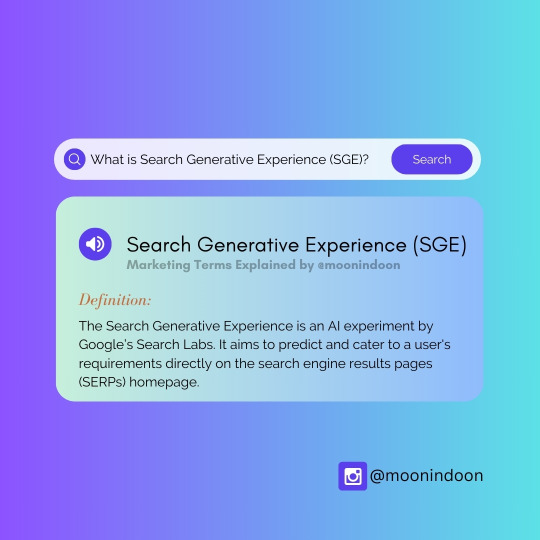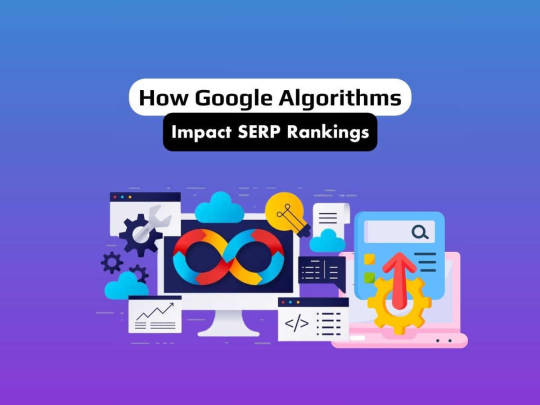#SERP (Search Engine Results Page)
Text
The Evolving Landscape of SEO: A Year of Transformations in Google's Algorithms and Beyond
Introduction:
As a seasoned SEO professional, I have closely observed the dynamic nature of search engine optimization and the ever-changing algorithms employed by Google. Over the past year, the SEO industry has witnessed significant transformations that have reshaped the way websites design services are ranked, the appearance of search engine results pages (SERPs), the prominence of local SEO, and the integration of AI in SEO strategies. In this article, I will outline the top 10 changes in SEO and Google, highlighting the key insights and trends that have emerged during this transformative period.
Algorithm Updates:
Google's algorithm updates have always been a focal point for SEO professionals, and the past year has been no exception. From the introduction of Core Web Vitals as a ranking factor to the continuous refinement of algorithms like BERT and RankBrain, Google has been on a mission to provide users with more relevant and high-quality search results.
SERP Enhancements:
Google has been constantly refining the appearance of its SERPs to enhance user experience and provide more contextually relevant information. Features like featured snippets, knowledge panels, and local packs have become more prominent, leading to a shift in SEO strategies towards optimizing for these rich results.
Rise of Zero-Click Searches:
With the growing prevalence of featured snippets and rich results, there has been an increase in zero-click searches, where users find the information they need directly on the SERP without clicking through to a specific website. This trend has necessitated a shift in SEO focus towards optimizing content for visibility in featured snippets to maintain organic traffic.
Mobile-First Indexing:
Google's mobile-first indexing initiative reached a significant milestone over the past year, with mobile versions of websites websites design services becoming the primary basis for indexing and ranking. This shift has emphasized the importance of mobile optimization, responsive design, and fast-loading pages in SEO strategies.
Core Web Vitals:
Google's introduction of Core Web Vitals as a ranking factor has underscored the significance of user experience metrics like page speed, interactivity, and visual stability. SEO professionals are now paying closer attention to factors that directly impact the user's website experience, emphasizing the need for optimizing performance and enhancing overall website usability.
Local SEO Dominance:
The past year has seen a further rise in the importance of local SEO, driven by increased user reliance on local search for finding products and services. Google My Business (GMB) optimization, local citations, and the prominence of map packs have become critical elements in local SEO strategies, providing businesses with an opportunity to target specific geographical areas.
E-A-T and Content Quality:
Google's focus on expertise, authoritativeness, and trustworthiness (E-A-T) has continued to shape SEO practices, with an emphasis on producing high-quality, authoritative content. Websites that demonstrate expertise and provide trustworthy information are more likely to rank higher in search results, making E-A-T an essential consideration in content creation and optimization.
Voice Search and AI:
The integration of AI-powered voice assistants, like Google Assistant and Amazon Alexa, has had a profound impact on SEO. Optimizing for voice search and conversational queries has become crucial, as search engines strive to understand natural language patterns. SEO professionals are now adapting their strategies to align with the nuances of voice-based search and provide users with concise, contextually relevant answers.
User Intent Optimization:
Understanding and fulfilling user intent has become a fundamental aspect of SEO. Google's algorithms are becoming increasingly adept at deciphering user intent, and websites that align their content to match user expectations are rewarded with higher rankings. SEO professionals now focus on creating content that satisfies specific user queries and intents, driving more targeted organic traffic.
Machine Learning and RankBrain:
Google's RankBrain algorithm, which utilizes machine learning to process search queries and improve search results, has continued to evolve. SEO professionals are now harnessing the power of machine learning to gain insights, identify patterns, and refine their strategies. Advanced SEO tools and techniques powered by AI are becoming indispensable for effective keyword research, competitor analysis, and overall SEO performance.
Conclusion:
The past year has been transformative for SEO, with Google's algorithm updates, changes in SERP appearance, the rise of local SEO, the integration of AI, and the evolving understanding of user intent. To stay ahead in this ever-evolving landscape, SEO professionals must continually adapt their strategies, optimize for mobile and user experience, prioritize local search, and leverage AI-powered tools. By embracing these changes and keeping a keen eye on emerging trends, SEO practitioners can thrive in the dynamic world of search engine optimization.
#SEO#Google Algorithms#Search Engine Optimization#SEO Trends#Digital Marketing#Google Updates#SEO Strategies#Algorithm Changes#SEO Best Practices#Website Optimization#SERP (Search Engine Results Page)#Organic Traffic#Content Marketing#SEO Techniques#Keyword Research#Link Building#Mobile SEO#Voice Search Optimization#User Experience (UX)#SEO Analytics
4 notes
·
View notes
Text

#An increase in SERP (search engine results page) rankings at Google#Bing etc. not only boosts your business's ability to generate traffic and leads#it increases the degree to which your audience sees your business as authentic. Build your brand with digital media & take the benefits of#ABSOLUTEDIGITALBRANDING#BEST#PUBLIC#RELATION#AGENCY#IN#CHANDIGARH#MOHALI#PUNJAB#NORTH#INDIA#onlinebranding#branding360degree#SEObrandingagency#Internetmarketing#Marktingstrategy#SEO#PPC#SMO#SMM#SeoCompany#digitalmarketingcompany#socialmediamarketingcompany#absolutedigitalbranding#searchengineoptimization#advertisingagencyinmohali#facebook
3 notes
·
View notes
Text
Google is revolutionizing the search results for better with the launch of SGE!
Ever wished for a smarter, more intuitive way to search online? Well, buckle up because Google's Search Generative Experience (SGE) is here to transform the way you explore the web completely!
🤖 Powered by cutting-edge artificial intelligence, SGE transforms your search experience from mundane to magnificent! Now you need not click through endless web pages.
🔧 Wondering how to activate this game-changing feature? Simply follow the steps outlined in this blog post and unlock the power of SGE for yourself!
📚 But that's not all! From its benefits in simplifying complex topics to its potential downsides and everything in between, ‘ve got you covered!
💼 And for all you savvy marketers and website owners out there, don't miss the exclusive insights on optimizing your content for SGE and staying ahead of the curve in the ever-evolving landscape of SEO.
🌐 Don't miss out on this groundbreaking innovation—check out this comprehensive guide to Google's Search Generative Experience now: https://www.tumblr.com/moonindoon/746198749933715456/understanding-google-sge

#moonindoon#blog#latest blog#latest#news#sge#search generative experience#seo#search engine optimisation consultants#marketing#marketing digital#digital marketing#website#web page#ranking#website traffic#traffic#thursday#sem#schema markup#result pages#search engine result pages#SERPs#innovation#AI#ai generative#generative ai#google labs#labs#artificial intelligence
0 notes
Text
Understanding Google SGE
Google Search Generative Experience (SGE) is a new way to search on Google. It's an experiment using artificial intelligence (AI) to give quick summaries of search topics without clicking on individual web pages.
It can help with:
Finding answers
Getting overviews of topics
Summarizing key points
Finding how-to instructions

Let's understand this with an example of how Google SGE could enhance a search query:
Imagine you're planning a weekend getaway to a new city and you want to find the best places to visit. In the past, when you searched on Google, you would have to click on various travel websites to gather information about attractions, restaurants, and activities. However, with Google SGE, when you search for "best things to do in Dehradun," instead of scrolling through multiple web pages, Google presents you with a concise list of top-rated attractions, dining spots, and activities directly at the top of the search results. These suggestions are curated from various trusted sources, making it easier for you to plan your trip quickly and efficiently.
How to Turn on Google SGE?
To use Google SGE, you'll need:
Chrome browser
Google account
To be 18 or over
To be in one of the 120+ countries where Google SGE is available
You have to opt in to see it. Here's how:
Open Chrome and sign in to your Google Account.
Go to Google on a new tab.
If available in your country, click the "Labs" icon at the top right.
On the "SGE, generative AI in Search" card, click the toggle icon.
After that, you should see AI-generated responses for some of your searches.

How Does Google SGE Work?
Google SGE uses generative AI, which means it can create content like text based on its training on lots of data. Google's model is called Pathways Language Model 2 (PaLM 2). It uses technologies like natural language processing and machine learning to understand your search and respond appropriately.
For example, you're interested in learning about the benefits of meditation for mental health. Usually, when you search for "benefits of meditation," you'd have to browse through multiple articles and research papers to gather information. However, with Google SGE, instead of sifting through various sources, Google provides you with a summarized list of the key benefits of meditation, such as stress reduction, improved focus, and enhanced emotional well-being. Additionally, Google may suggest follow-up questions like "How to start a meditation practice" or "Scientific studies on meditation benefits," allowing you to explore the topic further with just a few clicks..
Benefits of Google’s Generative AI Search
Easy-to-understand summaries of complex topics
More interactive experience with conversational results
Quick and direct information without navigating multiple websites
Potential Downsides of Google’s Generative AI Search
Limited availability in certain regions
Possibility of inaccurate information, especially for important topics like health
Impact on traditional search advertising revenue
Comparison with Similar AI-Powered Tools
Google SGE is different from ChatGPT and Bing's AI search. ChatGPT is more conversational, while Bing's AI search is already available worldwide.
Impact on SEO
Generative AI might reduce website traffic but could also bring higher-quality leads. Optimizing for SGE involves using long-tail keywords, creating quality content aligned with search intent, and implementing structured data.
Prepare for the Future
Google SGE is changing how people find information online. Keep optimizing your site and focus on creating helpful content in natural language that meets search intent.
#generative#generative AI#ai generated#google labs#Google Search Generative Experience#SGE#artificial intelligence#artificial intelligence (AI)#Google SGE#Pathways Language Model 2#PaLM 2#AI-generated#SEO#google search#SERP#search engine result pages#Google’s Generative AI Search#Chat GPT#Chatgpt#ai technology#machine learning#Google#search#gmail#keywords#traffic#seo services#Crawling#schema#schema markup
0 notes
Text
why keyword research is essential for SEO?
Understanding User Intent:
Targeting the Right Audience
Competitor Analysis
Optimizing Content:
Long-Term Strategy
Improving Website Structure
Understanding User Intent: Keyword research helps you understand what users are searching for and the intent behind those searches.
By identifying relevant keywords, you can tailor your content to match the intent of your target audience, increasing the chances of your content appearing in search results when users look for information related to your niche.
Targeting the Right Audience: Effective keyword research enables you to target specific demographics, geographic locations, or user segments that are most likely to be interested in your products or services.
By optimizing your content around relevant keywords, you can attract qualified traffic to your website, resulting in higher conversion rates and better ROI.
Competitor Analysis: Keyword research also involves analyzing your competitors to understand which keywords they are targeting and how they rank for them. This insight allows you to identify gaps in their SEO strategy and capitalize on opportunities to outrank them in search results.
Optimizing Content: Keywords play a crucial role in on-page optimization. By strategically incorporating keywords into your website's content, meta tags, headers, and URLs, you can improve your website's visibility in search engine results pages (SERPs) and enhance its overall relevance to search queries.
Long-Term Strategy: Keyword research is not a one-time activity but an ongoing process. As search trends evolve and new keywords emerge, regularly updating your keyword strategy helps you stay ahead of the competition and adapt to changes in user behavior and search engine algorithms.
Improving Website Structure: Keyword research can also inform website structure and navigation. By organizing your content around targeted keywords and creating logical pathways for users to navigate through your site, you can enhance user experience and make it easier for search engines to crawl and index your web pages.
In summary, keyword research is essential for SEO because it helps you understand your audience, optimize your content effectively, stay competitive, and improve your website's visibility and relevance in search engine results.
SEO, Rafiq Mia, Fundas Digital Marketing, seo by Rafiq Mia, seo by Fundas Digital Marketing, Search Engine Optimization, Keywords, Organic Search, On-Page SEO, Off-Page SEO, Meta Tags, Backlinks, Link Building, Keyword Research
#SEO#SearchEngineOptimization#DigitalMarketing#OnlineMarketing#SERP (Search Engine Results Page)#KeywordResearch#ContentMarketing#LinkBuilding#SEOtips#SEM (Search Engine Marketing)#GoogleRankings#OrganicTraffic#LocalSEO#Backlinks#SEOstrategy#WebAnalytics#SEOconsultant#SEOexpert#Rafiqmia#Fundasdigitalmarketing
1 note
·
View note
Text
Unleashing Success: Sociolabs, the Best SEO Company in Los Angeles

#Unle#Unleashing Success: Sociolabs#In the bustling digital landscape of Los Angeles#businesses are constantly vying for attention and striving to outshine the competition. Amidst this digital cacophony#one name consistently rises above the rest: Sociolabs. Renowned as the best SEO company in Los Angeles#Sociolabs has carved a niche for itself with its unparalleled expertise and innovative strategies.#When it comes to navigating the complex realm of search engine optimization (SEO)#Sociolabs emerges as the undisputed leader. With a team of seasoned professionals armed with cutting-edge tools and methodologies#Sociolabs delivers results that propel businesses to new heights of success. Whether you're a budding startup or a well-established enterpr#Sociolabs has the prowess to elevate your online presence and drive organic traffic to your website.#What sets Sociolabs apart from the myriad of SEO agencies in Los Angeles is its unwavering commitment to client satisfaction. Unlike other#Sociolabs takes a bespoke approach tailored to each client's unique needs and objectives. From keyword research and on-page optimization to#every aspect of the SEO strategy is meticulously crafted to deliver maximum ROI.#One of the hallmarks of Sociolabs' success lies in its ability to stay ahead of the curve in an ever-evolving digital landscape. The team a#ensuring that clients' websites remain at the forefront of search engine results pages (SERPs). By harnessing the power of data analytics a#Sociolabs empowers businesses to stay ahead of the competition and achieve sustainable growth in the digital realm.#Moreover#Sociolabs prides itself on transparency and communication#keeping clients informed every step of the way. Unlike fly-by-night SEO agencies that promise the moon but fail to deliver#Sociolabs maintains open lines of communication#providing regular reports and updates on campaign performance. This level of transparency fosters trust and confidence#solidifying Sociolabs' reputation as the go-to SEO partner for businesses in Los Angeles and beyond.#In conclusion#if you're seeking to elevate your online presence and dominate the digital landscape#look no further than Sociolabs. As the best SEO company in Los Angeles#Sociolabs combines expertise#innovation#and dedication to deliver results that exceed expectations. With Sociolabs by your side#success is not just a possibility – it's a certainty. So why settle for mediocrity when you can soar to new heights with Sociolabs as your#With Sociolabs
1 note
·
View note
Text
How Google Algorithms Impact SERP Rankings

Search Engine Results Pages (SERPs) are the lifeblood of any online business, driving valuable traffic to their websites. However, with billions of webpages vying for attention, ranking higher on SERPs is a complex, dynamic process governed by algorithms. Google, with over 90% of the search engine market share, continually updates its algorithms to provide better search results. In this blog post, we'll explore how Google's algorithms impact SERP rankings and discuss ways to stay ahead.
The Role of Google's Algorithms in SERPs
Google's primary purpose is to provide high-quality, relevant search results for its users. To achieve this, it uses complex algorithms that analyze and index countless websites, assessing them against multiple ranking factors. These factors, which range from website quality and relevance to user behavior and backlinks, play a crucial role in determining how your website ranks on SERPs.
Key Google Algorithms That Affect SERP Rankings
Over the years, Google has released several major algorithm updates that significantly impact SERP rankings:
1. PageRank: The original Google algorithm, PageRank evaluates websites based on the number and quality of backlinks, assuming that a site with more backlinks is likely to be more valuable or trustworthy.
2. Panda: Launched in 2011, the Panda algorithm assesses websites based on the quality of content. Factors like duplicate content, thin content, or low-quality content can negatively influence SERP rankings.
3. Penguin: Introduced in 2012, Penguin targets link schemes or manipulative link-building practices by evaluating the quality of backlinks and penalizing sites engaged in such tactics.
4. Hummingbird: Unveiled in 2013, Hummingbird focuses on understanding the user's search intent, considering semantic search and natural language processing. This means delivering search results that cater to the user's intent, rather than focusing merely on keywords.
5. Mobilegeddon: Launched in 2015, Mobilegeddon prioritizes mobile-friendly websites, encouraging businesses to optimize their sites for mobile devices.
6. RankBrain: A machine learning-based algorithm integrated into Hummingbird in 2015, RankBrain helps Google understand complex or never-seen-before queries, improving search results accuracy.
7. BERT: The Bidirectional Encoder Representations from Transformers (BERT) update, introduced in 2019, further expands Google's understanding of natural language processing, enhancing its ability to understand context and user intent accurately.
Staying Ahead of Google Algorithm Updates
Google constantly tweaks its algorithms, aiming to improve search results and user experience. To maintain or improve your SERP rankings, consider these best practices:
1. Create High-Quality, Relevant Content: Focus on offering original, valuable content that answers users' questions and provides them with the information they seek.
2. Optimize for User Intent: Understand your users' search intent and create content that addresses their needs. Don't just rely on keyword optimization, but approach your content with context and relevance in mind.
3. Build Quality Backlinks: Secure natural, high-quality backlinks from authoritative sites, as Google continues to value high-quality backlinks in its ranking factors.
4. Enhance User Experience: Focus on website speed, easy navigation, and a responsive design to create a seamless user experience across devices.
5. Monitor Algorithm Updates: Stay up-to-date on Google algorithm updates and adjust your strategies proactively to adapt to the changes.
Conclusion
Google algorithms play a significant role in determining SERP rankings, affecting your website's ability to reach its target audience. Staying ahead of these algorithm updates and implementing best practices for quality content, user intent, backlinks, and user experience is crucial to maintaining and improving your position on SERPs. Keep in mind that Google's primary goal is to provide relevant, valuable search results. Aligning with this objective and continuously optimizing your website based on changing algorithms ensures that your website remains competitive and consistently ranks high on SERPs.
#google algorithm#serp (search engine results page)#search engine optimization#seo#seo services#digital marketing#growyourbusiness
0 notes
Text

Every SERP is unique, even for search queries performed on the same search engine using the same keywords or search queries. This is because virtually all search engines customize the experience for their users by presenting results based on a wide range of factors beyond their search terms, such as the user’s physical location, browsing history, and social settings. Two SERPs may appear identical, and contain many of the same results, but will often feature subtle differences.
#on page seo#seo#serp#search engine result pages#search engine customize#result based#About serp#understanding search engine
0 notes
Text
The Value of SEO-Friendly Structure: Increasing User Experience
A website that ranks highly on search engine results pages and offers an enjoyable experience for users is essential in today's digital world, where competition is intense and attention durations are short. A key factor in reaching this precise balance is setting in place an SEO-Friendly structure. The structure of your website can be made both user- and search engine-friendly, which will greatly improve user experience and improve results.

An SEO-Friendly structure, most importantly, makes sure that search engines can properly crawl and index your website. To understand the significance and context behind every page on your website, search engine crawlers depend on a well-structured content structure and easy navigation.
You may facilitate search engines' understanding and proper ranking of your pages by using headings, meta tags, and logical content organisation into groups.
Additionally, a well-structured website improves the user experience by improving visitors' search for content. When visitors arrive at your website, they want an easy navigation experience and a fast search for the right data. Product pages, blog entries, and informational resources may all be quickly found and accessed by users with the help of a well-structured website.

Mobile accessibility is a critical component of an SEO-Friendly system. It's essential to make sure your website is mobile-friendly, as the number of people using smartphones and tablets rises. A responsive design offers customers an identical look and feel across devices by fluidly adjusting to varying screen sizes and resolutions. In addition to improving user experience, giving mobile optimization top priority increases your site's exposure in mobile search results, which is a significant consideration for search engines like Google.
Additionally, internal linking—which is essential for distributing link equity throughout your website—is made easier by an SEO-Friendly layout. Important sites can receive authority and relevance signals from well-placed internal links on your website, which will increase their exposure and search engine ranking. Internal linking also facilitates deeper navigation and related content discovery for users, which raises engagement and lowers bounce rates.

In addition to being technically sound, an SEO-Friendly structure improves user experience by promoting consistency and transparency in navigational design. Users are more likely to remain longer, investigate more, and eventually convert when they come across a website that is well-organised and easy to use. On the other hand, users may become frustrated by a cluttered or unclear website structure, which can result in high bounce rates and missed chances.
For more Information Visit our Website = Apna Laptop
#seo#search engine#DigitalMarketing#OnlineMarketing#SEM (Search Engine Marketing)#ContentMarketing#KeywordResearch#LinkBuilding#SERP (Search Engine Results Page)#OnPageSEO#OffPageSEO#SEOStrategy#SEOTools#GoogleRanking#WebsiteOptimization#MetaTags#Backlinks#SEOAnalysis#LocalSEO#MobileSEO
0 notes
Text
An Introduction to SERPs
Search engine results pages, also known as “SERPs” are where Google’s reply to a user’s search query is shown. Featured snippets, Information graphs, paid Google Ads results, and video results regularly show up in SERPs.
Understanding how and what a SERP is would greatly increase your chances of ranking your webpage high in the search results. It might be arduous, but it is usually the key to bringing your content to the next level.
#seo#serps#search engine results page#page#seo marketing#seotips#introduction to serps#seo company#marketing#digital marketing#digital marketing agency#seo agency
0 notes
Text
How to Make Any Article Human Written for Free
How to Make Any Article Human Written for Free
Unlocking the Power of Human-Written Articles: A Revolutionary Approach
In the ever-evolving landscape of online content, the demand for unique and engaging articles has never been more significant. Crafting content that not only resonates with your audience but also stands out in the vast sea of information is a challenging task. This article…

View On WordPress
#boost traffic#ChatGPT#Content creation#content creators#content engagement#content quality#content uniqueness#engaging articles#Google AdSense approval#Google ranking#GravityWrite#higher rankings#human touch#Online visibility#plagiarism check#Search engine optimization#search engine results page#SERP#Small SEO Tool#The Insider&039;s Views#unique#web tool#website traffic.
0 notes
Text
Title: Effective Keyword Research: The Ultimate Guide to Boosting Your SEO
Introduction:
In the world of digital marketing, effective keyword research plays a pivotal role in driving organic traffic to your website. By identifying and targeting the right keywords, you can optimize your content to rank higher on search engine result pages and attract the right audience. In this comprehensive guide, we will delve into the importance of keyword research and provide you with practical tips to enhance your SEO strategies.
Why Keyword Research Matters:
Keyword research serves as the foundation of any successful SEO campaign, allowing you to understand what your target audience is searching for. By identifying relevant keywords, you can optimize your website content, blog articles, and product pages accordingly. This not only improves your chances of ranking higher in search results but also helps you connect with potential customers who are actively seeking the products or services you offer.
Thorough Research Leads to Targeted Results:
To conduct effective keyword research, it's crucial to invest time into understanding your niche and industry. By conducting thorough research, you can uncover valuable insights about your target audience, their search intent, and the competition within your industry. This knowledge will enable you to choose the right keywords that align with your business objectives and have a higher chance of ranking well.
Understanding Long Tail Keywords:
While high-volume and competitive keywords may seem tempting, targeting long tail keywords can often yield more fruitful results. Long tail keywords are more specific phrases and have lower search volume compared to broader keywords. However, they often indicate strong user intent and convert at a higher rate. For instance, instead of targeting "digital marketing," consider focusing on "effective content marketing strategies for small businesses."
Utilizing Keyword Research Tools:
To simplify the keyword research process, various tools are available to identify relevant keywords that will boost your SEO efforts. By utilizing tools such as SEMrush, Ahrefs, or Google Keyword Planner, you can uncover valuable insights such as search volume, competition level, and potential long tail keywords related to your topic. These tools also provide suggestions and variations that can help you discover untapped keyword opportunities.
Optimizing Your Content:
Once you have identified your target keywords, it's important to integrate them strategically throughout your content. Aim to incorporate the focus keyword at least 10 times within your article, ensuring it appears naturally and does not disrupt the flow of your writing. Additionally, include the focus keyword at least three times in your headings to provide a clear structure and signal search engines about the relevancy of your content.
Enhancing Readability and User Experience:
To engage readers and improve the readability of your content, consider incorporating short and long sentences to maintain a dynamic flow. Utilize uncommon yet simple terminology to add originality to your writing and captivate your audience. Break up longer paragraphs with relevant subheadings, bullet points, or numbered lists to improve readability. An organized and well-structured article not only appeals to readers but also indicates to search engines that your content is of high quality.
Encouraging Audience Engagement:
In conclusion, we have explored the significance of effective keyword research and how it forms the basis for successful SEO strategies. We invite you to leave your comments and thoughts in the comment box below. If you found this article helpful, don't hesitate to share it with your friends and colleagues to help them enhance their SEO efforts too.
#KeywordResearch#SEOTechniques#OrganicTraffic#LongTailKeywords#SearchEngineOptimization#SEOTools#RankingImprovement#DigitalMarketing#ContentStrategy#SERP (Search Engine Results Page)#WebTraffic#KeywordStrategy#SEOAnalysis#ContentOptimization#SEOTips
0 notes
Text
SEO Topics for Beginners | MD Jahid Hasan

If you're looking for SEO Topics for Beginners, Here Are Some Relevant SEO Tips:
Keyword Research:
☞ Keyword Planning
☞ Long-tail Keywords
☞ Competitive Keywords
On-Page SEO:
☞ Meta Tags
☞ Title Optimization
☞ Content Optimization
Off-Page SEO:
☞ Link Building
☞ Social Media Marketing
☞ Guest Blogging
Content Marketing:
☞ Quality Content
☞ Blogging Tips
☞ Content Strategy
Technical SEO:
☞ Website Speed
☞ Mobile Optimization
☞ XML Sitemap
Analytics
☞ Google Analytics
☞ User Behavior Analysis
☞ Conversion Tracking
Local SEO:
☞ Local Business Listings
☞ Google My Business
☞ Local SEO Tips
SEO Tools:
☞ SEMrush
☞ Moz
☞ Ahrefs
Algorithm Updates:
☞ Google Algorithm Updates
☞ Core Web Vitals
☞ SEO Trends
SEO for WordPress:
☞ Yoast SEO
☞ SEO Plugins
☞ WordPress Optimization
These tags can help you explore various aspects of SEO and provide more targeted information for beginners.
#SEOtips#DigitalMarketing#SearchEngineOptimization#ContentMarketing#OnlineMarketing#KeywordResearch#GoogleRanking#WebTraffic#SEM (Search Engine Marketing)#SERP (Search Engine Results Page)#LinkBuilding#SocialSEO#SEOTools#GoogleAlgorithm#MobileSEO#WebAnalytics#PageRank#SEOStrategy#LocalSEO#Backlinks#Mdjahidhasan#jahidhasan#sagewarriorit
0 notes
Text
The Power of Search Engine Marketing (SEM)
In today's dynamic digital landscape, search engines have evolved into indispensable tools that permeate various industries and institutions. From digital marketing and healthcare to education and E-commerce, search engines have become integral to our daily lives. These powerful platforms not only facilitate information retrieval but also offer an incredible opportunity for businesses to outpace the competition, expand their online reach, and boost brand awareness. Welcome to the world of Search Engine Marketing (SEM) – a game-changer for businesses of all sizes.
Understanding SEM: More than Just SEO
While many are familiar with the concept of Search Engine Optimization (SEO), fewer may understand the pivotal role that search engines play in SEM. SEM is a dynamic form of online marketing that empowers businesses to harness the full potential of search engines for promoting products, services, and meaningful connections with stakeholders.
SEM goes beyond mere website optimization; it's a strategic approach to advertising that harnesses the power of search engines to propel your business forward. Whether you're an established corporation or a budding startup, SEM can be your secret weapon in accelerating the customer buying process and boosting marketing effectiveness.
Speeding Up the Buying Process
Immediate Visibility: Unlike organic SEO, which takes time to build and rank, SEM provides immediate visibility on search engine results pages (SERPs). Through paid advertisements, your business can leapfrog competitors and gain prime real estate on SERPs, ensuring that potential customers see your offerings right away.
Highly Targeted Advertising: SEM allows you to pinpoint your audience with precision. Through advanced targeting options, you can tailor your ads to specific demographics, interests, and geographic locations. This means you're not just reaching any audience – you're reaching the right audience, increasing the likelihood of conversion.
Budget Control: SEM is flexible and budget-friendly. You have full control over your advertising spend, ensuring that you get the most out of your marketing budget. Whether you're looking to start small or scale up, SEM can adapt to your needs.
Trackable Results: SEM provides clear, measurable results. With analytics and tracking tools, you can monitor the performance of your campaigns in real-time. This data-driven approach allows you to make informed decisions and optimize your strategies for maximum impact.
Embarking on Your SEM Journey
Ready to harness the power of SEM for your business? Here's how to get started:
Set Clear Goals: Define your objectives. Are you looking to boost website traffic, increase online sales, or drive brand awareness? Understanding your goals is the first step in crafting an effective SEM strategy.
Keyword Research: Identify the keywords and phrases that are relevant to your business. These keywords will be the foundation of your SEM campaigns.
Ad Creation: Craft compelling, concise ads that resonate with your target audience. Highlight your unique selling points and use engaging visuals to capture attention.
Budget Allocation: Decide on your budget and allocate it strategically to different campaigns and keywords. Remember, SEM offers flexibility, so you can adjust your spend as needed.
Monitoring and Optimization: Continuously monitor the performance of your SEM campaigns. Use analytics to track clicks, conversions, and ROI. Make data-driven adjustments to optimize your campaigns for better results.
Search Engine Marketing (SEM) is more than just a buzzword; it's a strategic powerhouse that can propel your business to new heights in the digital world. By harnessing the immediate visibility, precision targeting, budget control, and trackable results that SEM offers, you can outpace the competition, connect with your audience, and grow your business in today's competitive online landscape. Start your SEM journey today and unlock the full potential of search engines for your brand's success.
Engage with us to discover the potential with Mystic Web Designn!
#Search Engine Marketing (SEM)#dynamic digital landscape#digital marketing#e-Commerce#boost brand awareness#promoting products#services#organic SEO#build and rank#search engine results pages (SERPs)#paid advertisements#specific demographics#interests#audience#increasing#tracking tools#Keyword Research#Monitoring and Optimization
1 note
·
View note
Text
Elevate your website's presence on search engines with these key pointers:
🔍 Optimize meta tags and descriptions for higher visibility.
📝 Craft high-quality, relevant content with strategic keywords.
🔗 Focus on building strong internal and external links.
Want to dive deeper into boosting your website's ranking in search results? Check out my detailed guide: Improve Your Website Ranking in Search Results. Uncover actionable insights to propel your site to the top of search engine results pages!
#search engines#websites#privacy#serp (search engine results page)#seo tips#seo services#seo#digital marketing#social media marketing#socialmediamarketing#online marketing
0 notes
Text
As the offline mode of running a business has almost become a phenomenon of the past, most of the businesses have been hiring the SEO services across India:Get more information please read this blog.
0 notes